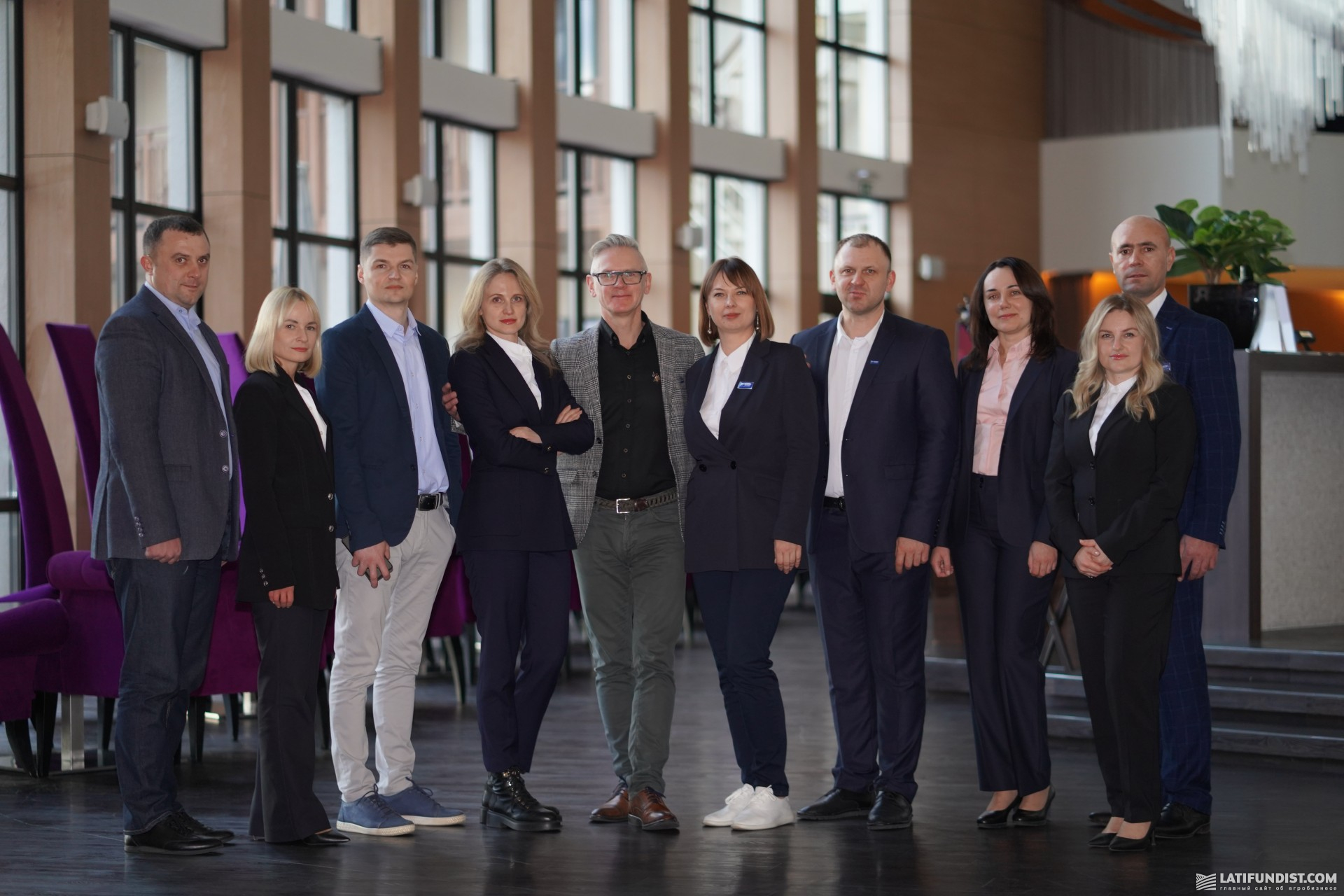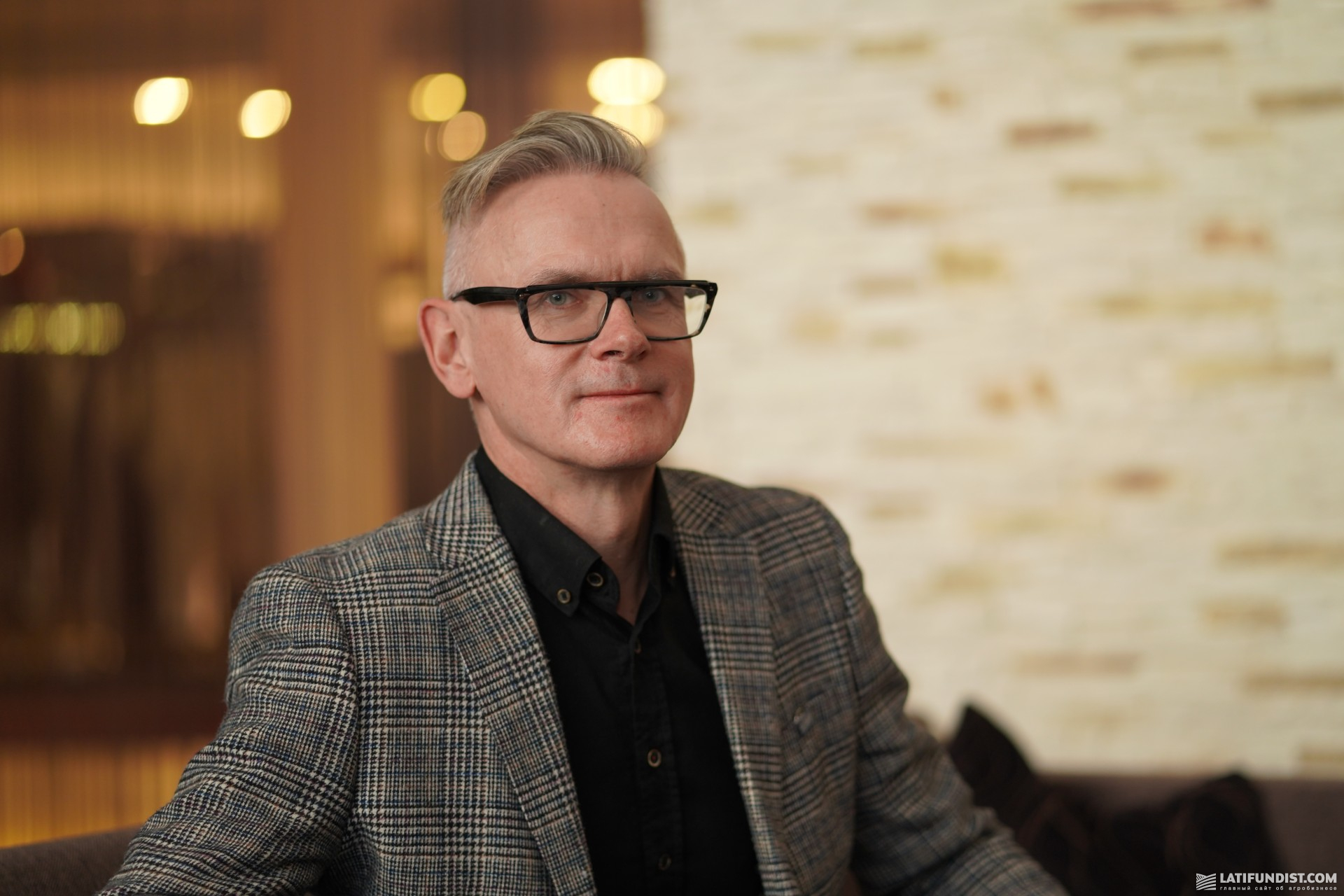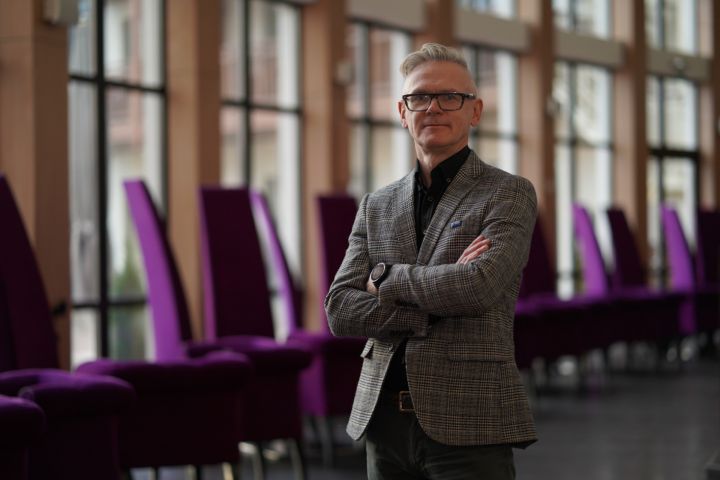Cezary Urban: Ukraine Will Join the European Union. It Will Happen Sooner Rather Than Later
Cezary Urban was appointed Head of BASF Agricultural Solutions in Ukraine on October 1. He has been with BASF for 18 years. Cezary is originally from Poland, but with his new appointment he started learning Ukrainian. We asked him about new products, the company's goals in Ukraine, the distribution model in the near future, the protests in Poland, and much more.
In the second part, you will find out how BASF Agricultural Solutions will develop in Ukraine in the near future, what new products and support programs the company will introduce in the near future, and why Cesary Urban prefers the free market and is optimistic about a peaceful resolution of the situation between Ukrainian and European farmers.
The turbulent Ukrainian agricultural market
Latifundist.com: What was your first impression when you got to know that you were appointed in Ukraine? There is war in the country, and the market is in crisis. There are problems with logistics, issues with currency, and a myriad of challenges to contend with.
Cezary Urban: So, I was essentially asked by my boss if I would be interested in taking on such a challenge. Without much hesitation, I expressed my willingness to accept this challenge because I thrive on challenges. Throughout my entire professional life, I've embraced challenges and undertaken new tasks as I believe it is the only way to foster personal and professional development. Continuously doing the same job for an extended period can create a comfort zone that, in the long run, isn't beneficial for me, the team, or the company.
Therefore, I eagerly accepted this job opportunity, and Ukraine has always held a special place in my heart. I signalled to my bosses a few years ago that I was ready to relocate to Ukraine, although this was before the onset of the war. While full relocation is not currently possible due to corporate security standards, I am still delighted to take on this position.
Regarding the current situation, I acknowledge that it is a challenging one. I understand that there are difficulties, especially for our customers and farmers, concerning the export of products, which, in turn, impacts commodity prices. However, global commodity prices are currently very low, and we are in a crisis. This is not unique to Ukraine; similar situations exist in Poland, Germany, and other countries. While Ukrainian prices are even lower due to the war and additional transportation costs, I believe that crises also present opportunities for a turnaround and success.
I firmly believe that Ukraine deserves these successes, and both Ukrainian farmers and distributors deserve recognition. My Ukrainian team and I are fully prepared to assist our customers, including farmers and distributors, in achieving these successes.
Latifundist.com: You have mentioned complicated exports, blocked logistics, and low prices for commodities, what do you think about this situation on the Ukrainian borders?
Cezary Urban: I would say, first of all, if you are asking about regulations, I'm probably not the best speaker because I've always been a fan of the free market, and I believe that the market has its power, and if it is free, it will regulate itself. I'm a fan of the liberal economy. However, the current situation is quite complex, and there are many factors at play.
Regarding protests in Poland, we are currently in a period of turbulence due to the recent elections in October. We are waiting for the new government, and the changing political landscape has led to protests and opportunities for various societal and business groups to advocate for their interests. During the political campaign, politicians made populist promises catering to specific groups of voters, creating conflicts.
Now, after the election, the situation has improved significantly. Regarding strikes, there were two types of strikes in Poland before the election: one in spring and another in summer, both initiated by farmers. They were advocating for government protection of borders, as they perceived that grain from Ukraine was impacting prices. Currently, there are strikes on the border by Polish transportation businesses, protesting the need to meet higher standards in the European Union compared to the different standards in Ukraine. I hope that the current situation will be resolved soon.
Currently, there are strikes on the border by Polish transportation businesses, protesting the need to meet higher standards in the European Union compared to the different standards in Ukraine.
Speaking about commodity prices and the earning potential for farmers, a change in the global agriculture situation is necessary. As we operate in the global market, an increase in the prices of winter wheat, oilseed rape, corn, and sunflower would benefit both Ukrainian and Polish farmers. Fortunately, it seems that we are currently at the bottom of the price cycle, and I don't expect further decreases.
Any change in the global market, such as a drought in South America or elsewhere, can significantly impact the market dynamics. We are already observing some changes in the market for vegetables and apples, with prices slightly increasing in Poland and reportedly in Ukraine as well.
Development in Ukraine
Latifundist.com: How do you see the development of BASF agricultural solutions in Ukraine?
Cezary Urban: So, definitely, we have to look at the market trends and identify which segments are growing the most. This includes farmers ranging from the largest agroholdings to big and smaller farms. Additionally, we need to consider the development of specific crops. Currently, crops like sunflower and soy are in a growing stage, while winter cereals show a reduction in the area. Considering all these factors is crucial for planning our portfolio development.

Having an updated product portfolio strategy and customer strategy, which applies to both farmers and distributors, is essential. Connecting these two aspects is where campaign management plays a vital role. This involves determining the type of commercial and communication offers we want to present to specific market groups. Geographical differentiation, considering different regions, and segmentation based on farmer types are key components.
When addressing different farmer segments, such as those investing intensively and aiming for high yields versus those content with lower yields, we tailor our offers accordingly. This includes variations in service levels, treatment options, and price segments. The challenge lies in presenting this complexity in a digestible frame so that each sales colleague understands what to sell, to whom, and how much time to invest with each farmer and customer. It's important that our distributors are also aligned with our targets.
Latifundist.com: Will you offer new seeds and crop protection products for the vegetable market? Is it for small farmers or big companies as well?
Cezary Urban: Here, again, we are starting with crops, defining our portfolio and outlining what we want to develop. Our target for the next year is to enhance the Revysol portfolio, and specifically, we will introduce Reviona. We will also examine the largest segments in Ukraine related to vegetables and tailor our approach to address those segments.
Considering the structure of Ukrainian farms, which are the largest in Europe, we have a significant opportunity to introduce our products on a substantial number of hectares. Regarding the vegetables in the portfolio, we are particularly strong in potatoes and have a robust presence in the protection of tomatoes based on our current and future portfolio. These are key segments where we aim to grow.
As for the portfolio of seeds, especially from Nunhems, we can extend our focus to other crops.
Latifundist.com: Wheat and sunflower are among the key crops in Ukraine. And will there be new products?
Cezary Urban: Yes, there will be new products. As I have mentioned, when we launch the Revysol portfolio in the next years, we will have a full program for cereals for T1, T2, T3 with new products and a combination of Revysol. In the case of sunflower and soy, which are also crucial crops, we will launch new products based on Revysol.
BASF's position in the Ukrainian market
Latifundist.com: During the war, Ukrainian farmers are trying to save money, and many have started using cheaper crop protection products. The share of multinational companies in the Ukrainian market has decreased. Is it so and how does BASF deal with it?
Cezary Urban: Now, the most significant challenge I currently face is obtaining reliable information about the market dynamics. Different sources provide conflicting information. Industry barometer data indicates a market decrease this year, while panel data suggests an increase. Additionally, when examining our market shares, they exhibit different trends in both sources.
Now, the most significant challenge I currently face is obtaining reliable information about the market dynamics. Different sources provide conflicting information.
Looking at the 2023 results, I don't observe significant changes in BASF's position or our market standing. Farmers seem to be opting for more affordable products in response to global commodity crop trends. The future trajectory will depend on changes in global commodity prices and the export possibilities for Ukrainian farmers. Encouragingly, recent information suggests an increase in ships carrying grains via Odesa, instilling optimism for the next season.
As for generics and their growth in the market, there are waves. During the prosperous period of 2020-2021, driven by favourable commodity prices and a thriving agro-business globally, farmers were more willing to invest in R&D products and expensive alternatives. R&D companies, like ours, may currently be experiencing a slight decline, but this is part of the current trend, and it may reverse next year. It's a market trend that goes through cycles.
Supporting Ukraine in war with russia
Latifundist.com: How does a global company support Ukraine in the war with russia?
Cezary Urban: First and foremost, BASF's immediate focus has been on ensuring the safety and well-being of its team members. This involved the relocation of colleagues and providing support for those affected by the war. The company also prioritized the stability of its supply chain, making significant changes in warehousing to ensure operations could continue even during wartime, with minimal disruption.

In terms of supporting customers, BASF in Ukraine initiated a donation campaign last year called "Borscht," providing vegetable seeds for Ukrainian farmers. Additionally, BASF is working on financial solutions in collaboration with partners such as banks to help manage cash flow for both distributors and farmers. This multifaceted approach reflects BASF's commitment to providing comprehensive support during challenging times.
Latifundist.com: Will there be financial programs?
Cezary Urban: Yeah, we have a program already running this year with Raiffeisen Bank, and we aim to extend it next year. This program offers farmers the opportunity to access more affordable credits based on our collaboration with Raiffeisen Bank. In addition to financial support for farmers, we are committed to supporting our employees during these challenging times.
Since the early days of the war, especially in Poland where I closely observed the war's development, we have been hosting many Ukrainian families. Some stays are temporary, while others are more long-term. For instance, a colleague of mine is hosting a Ukrainian boy who has been attending school in Poland for one and a half years. I take pride in these initiatives, and as a global company, BASF will continue to explore additional ways to support farmers where it is most needed. We are currently preparing a donation campaign, and further details will be officially announced in December. What is most important is that we will identify farmers, who need help, based on the information from the independent association showing, let's say, those farmers who are the most affected by the war.
Latifundist.com: It is known that BASF Global has limited its business in russia and left only what is connected with food, hasn’t it?
Cezary Urban: Yes, we have cancelled the majority of our business in russia, which is reflected in more than 300 jobs being cut. Business-wise, it was a few hundred million euros that we decided to cut. It's a very strong decision for the company.
Latifundist.com: As Ukrainians, we are genuinely thankful to the company and to you, as a person from Poland, representing the Polish nation, for all the help that you have already provided and continue to do for us.
Cezary Urban: It's great to know that Ukrainian people are very thankful, despite all these problems and strikes. In my opinion, these are temporary and political issues. Looking at how the two nations are strong together, I can openly say that we have a clear target, and the biggest target for both Polish and Ukrainian societies is Peremokha, the victory of Ukraine.
In Poland, there were no doubts about supporting Ukrainians, whether privately as normal people offering housing support or facilitating transportation from the border. Many of my BASF colleagues were doing this. Additionally, our government provided all the military support from day one, convincing other governments that Ukraine needs assistance. In the first days of the war, it was not obvious to everybody in the world, but Poland, the USA, and the United Kingdom were very clear that we need to support Ukraine.
It's about giving strength because we believe in our victory, and it's great when we have someone who supports us. Spending more and more time in Ukraine, as this is already my fifth visit, totalling more than one month in Ukraine, and being in different cities such as Lviv, Kyiv, and currently in Bukovel, I am extremely impressed. First of all, by how brave Ukrainian society is, and secondly, by the strong spirit to live a normal life despite the fact that russians would like us to disappear. Even if we are in the underground, as I experienced during air alerts, we are still working and not giving up. Yesterday, for example, we had our product training for the next season in the underground shelter, showcasing our determination to continue
Latifundist.com: You have said that the warehouses were relocated to more secure regions of Ukraine.
Cezary Urban: Yes, some warehouses were relocated, but essentially, our key logistical operation last year was to diversify the risk. We are no longer solely dependent on one warehouse; instead, we have fewer warehouses, including those of our distributors. This, for me, is a great example of cooperation with distributors, providing us with the chance to operate even in the face of potential risks or attacks.
Regarding overcoming difficulties with transportation to and from Ukraine, we adapted quickly to the situation. So far, we have primarily used trucks for transportation, and we have managed 20 months of war without any supply chain issues.
Future of the Ukrainian agrarian market
Latifundist.com: What is your view of Ukraine's agriculture in the future?
Cezary Urban: I have to say that the Ukrainian agriculture market has the biggest potential in Europe for many reasons. First, and perhaps essential, is the size and structure of Ukrainian agriculture, which is highly consolidated. We have the largest number of hectares in Europe, and notably, some of the best soils on the continent, if not in the world. I believe, and please correct me if I'm wrong, that Ukraine possesses around 25% of the global black soils, making it a significant advantage for Ukrainian agriculture.
Considering this, it is undoubtedly a massive benefit for Ukrainian agriculture. Furthermore, with the already high level of technology, advanced machinery, and the onset of digitalization in Ukraine, the future looks promising. However, there are certain challenges, such as the ongoing conflict, hindering the full export potential. One can only dream that the war will soon be over, opening up the first significant opportunity for growth.
Moreover, if Ukraine becomes a part of the European Union, it could become the largest agriculture producer in Europe with unparalleled potential. I've noticed strategic investments from Ukrainian distributors, particularly in the western part of Ukraine along the border with the European Union. These investments include logistic warehouses and rail infrastructure.
Moreover, if Ukraine becomes a part of the European Union, it could become the largest agriculture producer in Europe with unparalleled potential.
This strategic move seems very clever to me for two main reasons. Firstly, due to the ongoing war, they can utilize both road and rail transportation to Europe, not solely relying on the Black Sea Corridor. Secondly, when Ukraine eventually joins the European Union, which I believe is more a matter of "sooner" rather than "later," these investments will enable the smooth and rapid transport of Ukrainian products to European markets. The foresight of these Ukrainian distributors in making these investments is truly commendable.

Latifundist.com: But what about the peaceful co-living of Ukrainian farmers and European farmers? As there are quite many challenges.
Cezary Urban: I understand your point. However, I must highlight that we faced a similar situation when Poland joined the European Union almost 20 years ago. The 1st of May 2024 marks the 20th anniversary of Poland's accession to the European Union. At that time, Poland, like Ukraine now, was one of the significant agriculture producers joining the EU. Over the years, by leveraging the European common policy of subsidies and programs, Poland successfully managed its integration. From this historical perspective, I believe that the European Union, drawing from its experience with the first expansion 20 years ago, will be able to smoothly integrate Ukraine into the European market.
It's crucial to recognize that if Ukraine becomes a part of the European market, it doesn't necessarily mean that 100% of the production will be destined for the European Union. Ukraine will have the opportunity to compete for other markets globally, just as it is currently doing in African, Asian, and American markets. With improved and advanced agricultural technology, Ukrainian farmers will likely be more competitive not only in Europe but also on a global scale.
Latifundist.com: You are an optimist.
Cezary Urban: Certainly, there is a significant opportunity. I base this on facts, drawing parallels with the experience of Polish farmers. Twenty years ago, we were heavily dependent on the internal market and the Eastern market, including russia. However, over the years, we successfully gained independence from the russian market. To illustrate, before 2014, prior to the russian invasion, we were selling 70% of our apple production to russia. Presently, we no longer sell any apples to russia, yet the business continues to thrive in Poland as we've explored alternative markets.
Is the Polish market still thriving? Yes, it is still thriving. I'm pleased that we no longer rely on selling Polish apples to russia, enabling us to process them locally or sell them to other markets. This shift has significantly contributed to the growth of the processing market in Poland. Interestingly, a similar trend is unfolding in Ukraine currently, where without export difficulties, more farmers and distributors are increasingly investing in processing. Despite the challenges and the need for substantial investments, the ongoing war motivates Ukrainian farmers to make strides in this direction.
Latifundist.com: Thank you for your confidence in Ukraine and inspiring conversation!
Sofiia Yaroshenko, Latifundist.com

